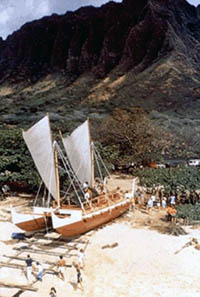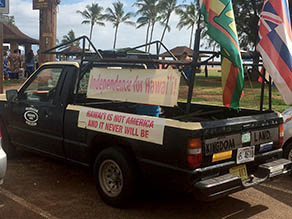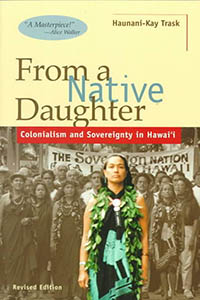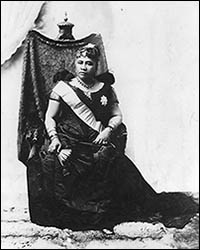 |
 |
 |
 |
||||||
|
|
|
|
|
|
|
|
|
|
| People | Environment | Invasives | Food Today | Sovereignty | Language | Sources & Links | |||||||||
 |
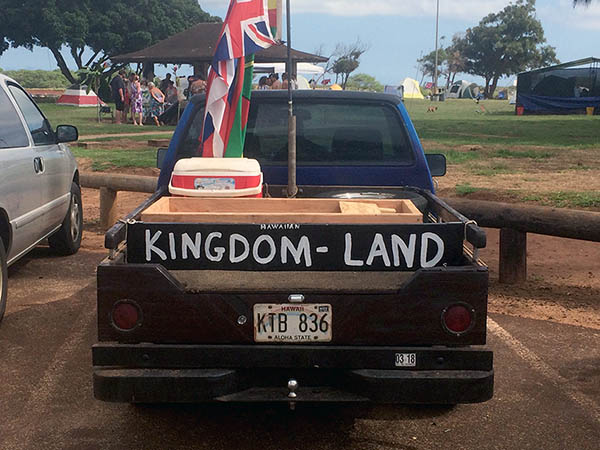
|
 |
|||||||
 |
“Through the Overthrow we saw a rebranding of who we are and what we are,” Donovan remarks. “They systematically took just what was appealing to the eye and promoted that as Hawaiian culture, and removed our spirituality from that—removed our beliefs and our social structure, overlaid this western mentality over the Hawaiian beliefs. So today it’s a struggle for a Hawaiian to reconnect with what once was, because that information has been so deeply suppressed and kept from our community. We do see it coming back. “We don’t quite have the understanding and the knowledge as a community of how great that impact has on us today. And so there are many of us who have been dedicated to educating our community of the current political situation. Many of us were actively involved in getting our community a little more involved in politics in order to be able to reverse some of those injustices that have been done. So we can at some level create legislation and re-create a situation where Hawai‘i can become the influence in the world that it once was, and not just what it is today—which is a far stretch from what we once were. “They called it a ‘dead culture’ for a long time, and we were leaning towards believing that. But the truth is, with the cultural renaissance during the seventies and the birth of the Hōkūle‘a and their first voyage, we’ve been able to come to realize that these knowledges of the Hawaiian people were never really suppressed, never really extinguished. The concept that came into play at that time is, what’s sacred should be kept secret, and the reasoning behind that is that in order to perpetuate these beliefs and keep them going for the time that would be more suitable for these secrets to be revealed again and to be lived, those secrets and those traditions should be perpetuated and carried on so when the environment was more acceptable, we could revive those. “There’s a global arising happening now. Indigenous cultures all over the world, we’ve seen it reclaiming their identity, reclaiming their place and making a stand in those places, where they belong. The places that governments have come and ejected them from or disregarded their connection to. And that’s basically what we’ve experienced as an indigenous people, as Hawaiians in our own homeland: we have these influxes of people who aren’t from here who decided that they knew better for us and wanted what we had and took it from us, and disregarded us and our place and our knowledge and our techniques and our practices and our rightful place: here. “I’m inspired because today we see so many more people having these conversations openly. The whole idea and concept behind the restoration of the Hawaiian Kingdom, this is a common conversation that we engage in nowadays, but it was completely kapu before. We hear it everywhere now. The nightly news is reporting about Federal Recognition and Hawaiians engaging in being recognized as an indigenous population—which never has happened. We’ve never been federally recognized. And I’m not saying that I’m for federal recognition, I’m just saying that the conversation is good. "Engaging in these conversations is good because it opens up the eyes of the people around us and it opens the ability to understanding the community that lives here. The community who rightfully belong here. “Ultimately, when we engage in these types of conversations and begin to broaden the understanding of our community, it creates a situation that ultimately the pinnacle of what we strive for as spiritually connected Hawaiians is the ability for kindness, compassion, and understanding to flourish. When we engage in those three simple aspects of life, when we engage every single kindness, when we engage every single understanding, when we engage in everything with compassion, it goes to that whole saying summarized, “You’ll catch more flies with honey than vinegar.” Essentially that’s foundational stuff we’re talking about, you know kindness, compassion. “Quite a few years ago,” Ka‘iulani recalls, “around the time of the Apology Bill—Public Law 103-150, when then-President Bill Clinton said he was sorry—in the form of law—to the Hawaiian people for the illegal invasion, overthrow and theft of our kingdom, I found myself at ‘Iolani Palace. There was Ms. Haunani-Kay Trask on the steps, and she yelled, ‘We are not Americans, we are not Americans, we will never be Americans!’ and it was all over for me. I realized what was wrong with me, why I felt so stuck in my life. "All my life I heard the whispers, the ‘S’ word—sovereignty. Our kūpuna were not allowed to say it, and we had American flags and we were Americans. But I’d heard the whispers. And all of a sudden someone was saying what was wrong with us and it just clicked for me. Ever since that day, I’ve kind of dedicated my life to communicating the truth of our illegal occupation here in Hawai‘i by the U.S. military-industrial complex. “This is the brain washing: you’re not an American but you’ve been raised to believe you are one. And then deep down inside you know something is wrong, especially when they are carrying your bones off in paper sacks and throwing them into the trash can, or whatever. So you know something is wrong, and then finally you name it. "But then you realize, ‘Okay, I’m not an American, I’m a Hawaiian in captivity. I have to play their game.’ And it all looks good on paper sometimes, their game. I found out that every time I signed into a Section 106 meeting, my signature was given to the Department of Interior to be used for Federal Recognition—which I am completely against. I found out that section 106 is merely a check point on the check list to get through it and lay down the cement on the bones. I found out that there is no stopping this illegal government. “So today what I tell people is that we have to prepare for the absolute worst, make sure we have a lot of food. And then now my question is asking the people. ‘Who is your closest living relative?’ if you know the answer to this question, you know where your loyalties lie, and you know who you are. The rest of you that don’t know the answer to the question, you better get ma‘a. “Who is your closest living relative for the Kanaka people? People say it’s the ocean, it’s Mother Earth, it’s your grandmother—no. It’s Hāloa—the taro plant is our closest living relative, and if you are exchanging Hāloa for dollar bills, you are no longer a Hawaiian, you are an American. 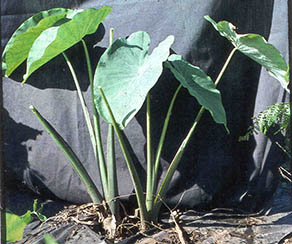
"There is a huge amount of money here and there is no reason that anyone needs to go hungry or without a place to live, without clean water and good food to eat, and that’s the problem though. Our ancestors said it very well in the song Kaulana Nā Pua. They said, ‘Do not affix your signature to the paper of the enemy, we don’t need their filthy money. We have our rocks and our sticks. The spiritual food of our land.’ We will eat rocks, and that, I think, most of all in today’s world is the litmus test when you’re looking at Hawaiian leaders. "Gandhi wore a loin cloth. If you see a guy that’s wearing a $150 Aloha shirt , run the opposite way. If you look at a leader and she’s driving a Mercedes Benz and just had some more Botox, can’t move her face, run the opposite way. Those are not Hawaiians—those are not Hawaiians. Those are the creation of the corporation and today’s system. And unfortunately for us, we’re poor. Look for leaders like Liko Martin, that live in their cars and write great operas about our history, and petition the United Nations, and use every last dime they’ve ever had to get to Washington D. C. to further the cause of justice for the Hawaiian people. 
“The government knows, the military knows—and I have lots of buddies that are high ranking in the military, as well as family—they absolutely know that we are illegally occupied. And today with their think tanks, the government is just, ‘How do we get around this?’ The Department of Interior says, ‘Let’s recognize them as Native Americans, and hey, we can throw a couple casinos at them, they’ll drink themselves to death.’ I’m not saying that happened to all the Native Americans, but what they’re proposing to do to us is actually even more dismal. Most of the nations in Moku Honu got in their treaties. “But people do know, people in power know, people making the big purchases know. Mark Zuckerberg knows—I know he knows. Hello, you created Facebook where we’re blabbing about it day and night on there. People know. But here’s the thing: I’ll be driving my taxi, and they’ll tell me, ‘So, are there members of the royal family left?’ and I look at them and I go, ‘I’m driving you.’ I say ‘But for a weird twist of fate, you would be driving me. And I would be staying in that big house you’ve rented for the week.’ Then they go, ‘Oh, well yeah, we heard. We’ve heard that Hawaiians are fighting for their sovereignty.’ “So you have this great dialogue with them, and in the end you hope that they remember anything you said. But mostly they say, ‘So where’s the best place to get sushi around here?’ And if you’ve ever worked in sales, that kind of really kills your fight, because you’re trying to sell them something huge. And really they just don’t want to bite that apple. They want some sushi. So what are you going to do? You got to just try and tell the stories, tell the stories, tell the stories, tell the stories. “I think about Martin Luther King and Gandhi a lot. And I think about Nelson Mandela in prison for 27 years, fighting Apartheid, and no one every thought he’d be president of South Africa. In 1980 the United States sanctioned South Africa and refused to be a part of the Olympics because of Apartheid, yet here in Hawai‘i they implemented apartheid. So I have to find some way to think that if justice was achieved there, it’s naturally got to occur here. "Twenty seven years? 124 years now since our Queen abdicated at gunpoint with her people threatened. Today we just kind of eke out our living, and I keep looking at Nelson Mandela. I keep looking at Gandhi, I keep looking at Martin Luther King, I keep looking at Asada Shakur and other heroes that give me hope. Native American heroes dead and alive. All over the world there are heroes, and I don’t claim to be one, but I have a very big mouth and I’m willing to say it out loud. “I do break down a lot. It’s been hard to have relationships. Even within your family, it’s very difficult because we are all so conditioned not to fight America, not to make trouble. Not to be a big mouth, not to talk about it, not to buck the system. So I’m not a nice girl, because I say all the things that people call me on the sly and said, “hey, you just crawled into my head and said out loud—thank you.” And that’s what keeps me going. “I break down a lot, I cry a lot, I have nightmares. It’s hard. Even though we’re not really colonized, I call it ‘colonization disorder.’ I recently heard it called ‘societal trauma,’ which is like, wow, they’re really figuring out that all of the bad things they do to people takes a toll, and that’s why most people are on anti-depressants, because they’re freaking out, going ‘Oh my god, you told me black was white, but now you’re telling me white is black, and we’re not supposed to lie. I don’t know.’ “The main thing though, is when I’ll have some uncle come up to me at a party in the dark, because it’s hard for me to socialize and mix in with mainstream because a lot of people are like ‘Hey, that chick’s crazy.’ So at family parties and stuff, I tend to stand on the outside in the dark with the bruddahs that are drinking—that are like the trouble makers of the family—and some older gentleman will come up to me and say ‘Eh, thank you. Mahalo nui for what you do, for saying it for us.’ “That’s absolutely it. The people are listening and you don’t even realize how many there are. When they come up to you at the drug store, they hear your voice and they go, ‘Oh, that’s you! Thank you.’ That’s it for me. It’s more than gold. “People often compare me to Pele, and some people in my family say that we are genealogically linked to Pele. Whether or not that’s true, I do have that ‘Alright, well I’m just going to blow the volcano and destroy the entire landscape right here, right now, knock it all down, cover it all up and then just start fresh.’ There are a lot of nicer people out there in the sense that they are a lot more diplomatic. For me I’m very direct, some would even say ‘sharp.’ “I always think about my grandmother’s eyes, right before she died. She was very confused and she’d say to me, ‘You the one fighting for our people.’ I don’t know how she knew that, because it was kind of forbidden in our house to be like that. Everyone was in the military and stuff. So I think about: If I’m perceived as sharp, think about every last grandparent that died with that look in their eyes, going ‘What happened to us? What’s happening here? Who am I? Why are my people suffering?’ And when you gauge it against that, I think ‘sharp’ is actually kind of a compliment. That means that I’m cutting into the truth. Like the sword they talk about in their bible—the sword of truth.” “Many of the kūpuna, the elders, of that time felt that it’s not about Hawai‘i becoming sovereign,” Leilani says, “it’s about the Hawaiian concepts going universal. That it wasn’t just the political, that here we are each sovereign. In the heart and in the na’au. The na‘au is more important. Heart, okay, but in the na‘au is just strong, seated right here, your gut. And that’s important, and when you get hit in the na‘au with something that you’re supposed to know or you know that something is not right, then that’s what needs to be worked on. Right here in the na‘au. “So in this day and age, having that respect for our culture, for our land, for the water, for the processes, for each other, for ourselves is tremendous, to move forward. Right now we do it through hula, we do it through music, through the arts. I’m ecstatic to have a radio show that I can share Hawaiian music and a few stories with people globally about our spirituality, our connections with everything that we have here. Like any practitioner again, as you’ve learned we not only have this core, we have another core of learning, and then a wider core, and then however it extends out to everything else. That’s what a practitioner has to learn. And so respect for that too is important. Without it, that means that person is blocked from even caring, or any compassion.”
|
 |
|
 |
In the next and final chapter, we will see what the people of Hā‘ena and of Kaua‘i are doing to move onwards.
|
 |
||
 |
|
 |
||

|
|
||||
| Copyright 2018 Pacific Worlds & Associates • Usage Policy • Webmaster |
||||
